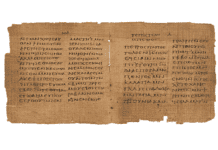RELATED: New World Council of Churches head draws criticism over Israel remarks
Your election was criticized by some Jewish voices because of your past writings about the Israeli government’s treatment of the Palestinians. They point to a 2016 paper in which you made positive references to the controversial boycott, divestment and sanctions movement and compared the Israeli treatment of Palestinians to apartheid. Do you have a response?
Let me put that in context: A group of church leaders from South Africa went to try and understand the Israel-Palestine conflict situation, and a number of those church leaders were Black church leaders — prominent Black church leaders in South Africa. We went to the Israeli side and the Palestinian side. We spoke to numerous people, including pastors, rabbis, local people and politicians, to get deeper insight into what was happening. We came back and wrote a response to what we had seen, heard and felt ourselves. The majority of Black pastors — and I was quite surprised by this — actually said, “You know, this is worse than apartheid,” from what they had experienced. Then we put together a collective statement.
The 2016 article was an academic article trying to capture those experiences and put them in context. The references and comparison of Israel and apartheid in South Africa were not words from my own mouth — they were academic references. If you went and read the article, for example, you will see it quotes the United Nations and their declaration of the apartheid state in Israel.
I’m not a politician, and I did not read things in a political light. Mine was an introspection from a biblical perspective on justice, (and) what I saw from a justice point of view did not sit well with me.
Unfortunately, particularly right-wing Jewish media took (the article) and, instead of actually focusing on the justice issues of Israel and Palestine, simply attacked me as being anti-Jewish and antisemitic — which is totally unfounded.
In South Africa, I’ve worked with Chief Rabbi Warren Goldstein for many, many years, working against apartheid, working against corruption in South Africa and working together to draw up a moral charter. (Jews in South Africa) know I’ve not ever mentioned that position — of being anti-Jewish or antisemitic. But standing up for justice? Yes, of course, I’m guilty. I will stand up for justice and truth, and I will not compromise on that.
So what are your views on the boycott, divestment and sanctions movement directed at Israel?
From a justice point of view — and again, I want to reiterate this aspect, not from a political point of view — the call for sanctions and boycotts in the apartheid South Africa certainly did bring the dismantling of apartheid in our country. There’s no question about that. So in my opinion, when I wrote in 2016, I basically was saying that boycott, sanctions and disinvestment could be an option. I was not necessarily calling for that. It probably still is an option to solve the crisis in Palestine and Israel. But it’s not something that I’ve openly advocated over the years.












